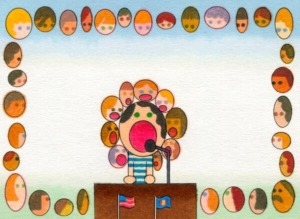
Part theater, part dirge, occasionally part circus, the meetings on any given night fill with people united by a common cause.
By Jessica Stolzberg, New York Times
Last winter, spurred by discontent, I made my way to the town hall. I didn’t know where to stand, where I would find the sign-up sheet or quite where to look when I spoke into the small microphone. But it doesn’t take long to fall in line with the rhythms of a municipal meeting. It’s a scene as fascinating as it is frustrating, as enlightening as it is disappointing, a startling mix of civic failure and success — often in a single night — and I have continued to enter the meeting chambers with regularity ever since.
What first took me here was a collective effort to convince the Town Council to prohibit the use of gas-powered leaf blowers. (It was quite a ride, but last summer we succeeded.) What I experienced over many months compelled me to continue attending the Town Council meetings and to add others — the Planning Board, the Historic Preservation Commission, the Board of Education — all part of the connective tissue of our town’s six square miles and two ZIP codes. And it turns out, I can stream all of them from home, most on the town’s YouTube channel, which means on certain nights these meetings play out in my family’s kitchen.
Part theater, part dirge, occasionally part circus, the meetings on any given night fill with people arriving on their own or as part of small groups, united by a common cause. In time, themes appear: the Fire Department’s budget, a controversial development project, pedestrian safety, a dearth of senior services, cannabis licenses. Attend enough, and you come to recognize fellow regulars, exchange nods, smiles and eye rolls while you sit alongside one another, wait in a snaking public comment line or whisper in the hallway. Once, when a contentious meeting went late, someone, perhaps anticipating the rancor, passed out homemade cookies.
Municipal meetings are where the guts of a community spill out. In ours, the curved dais is the grounding structure of a stage for different players with different roles in making this town work (and not work). I’ve become familiar with quite a cast: the pragmatic, the apathetic, the insightful, the silent; those who know their stuff and those who leave me questioning how they got into their seats. A topic in one meeting can bleed into the next, where additional scrutiny is required by a different group, one that soon fills the dais and brings with it a different crowd. Sometimes a member of one board shows up at the meeting of another, like a TV crossover episode where you have to adjust to seeing cast members from separate shows share a screen. Agenda items boomerang, repeat and sometimes languish, as resolutions are made, votes cast.
Our time together is dictated by rules of conduct that sometimes chafe. Time limits during public comment are enforced differently, depending on who is at the helm. The mayor interrupts and calmly insists on a finish; at the Board of Education, the microphone is turned off when the clock strikes zero, abruptly muting speakers who must walk away. Cries of incredulity, collective groans and demands for answers that are not forthcoming can fill the room. Laughter is rare.
I’ve also heard public comments so stirring in their delivery and clarity that I’ve gone back to the recordings to hear them again. Across three Board of Education meetings, a pending baseball field renovation brought a long line of pleading and agitated speakers, creating an increasingly miserable divide: athletes on one side, neighbors and environmentalists on the other. A woman pressed hard on the implications of a plan for an artificial turf field that would require cutting down old-growth trees. “This is our patch,” she implored. “We want to cut down trees and dump a bunch of plastic in the ground? This is asinine. It’s backwards. It’s inside out. Do better.”
The most important part of these meetings is always the ensemble of townspeople who stand at the small podium to ask, sometimes beg, that our needs be met, wrongs be prevented or righted. There is little praise; there is always ire. I’ve come to realize my town is loosely held together by individuals, elected and appointed, whom I could just as easily pass in the grocery store bagging a head of lettuce. But in this room, our visibility and our voices create a symbiosis, even if tenuous and tense, between those in power and those who granted it to them. We can get close enough to remind them of our expectations — or simply that we are watching.
Most know too little of what is happening, not happening or handled poorly in this place, this patch, we call home. Now, when I walk or drive the streets of my town — see people shopping, eating, rushing, striving — I wish they knew what happened last night, the endeavors of our town and its people, the location of the community’s fault lines. As it did for me, it may take a cause of their own for them to open the chamber doors and come inside.
Jessica Stolzberg is a writer and freelance editor. Her work has appeared in The Washington Post, Slate and The New York Times.

